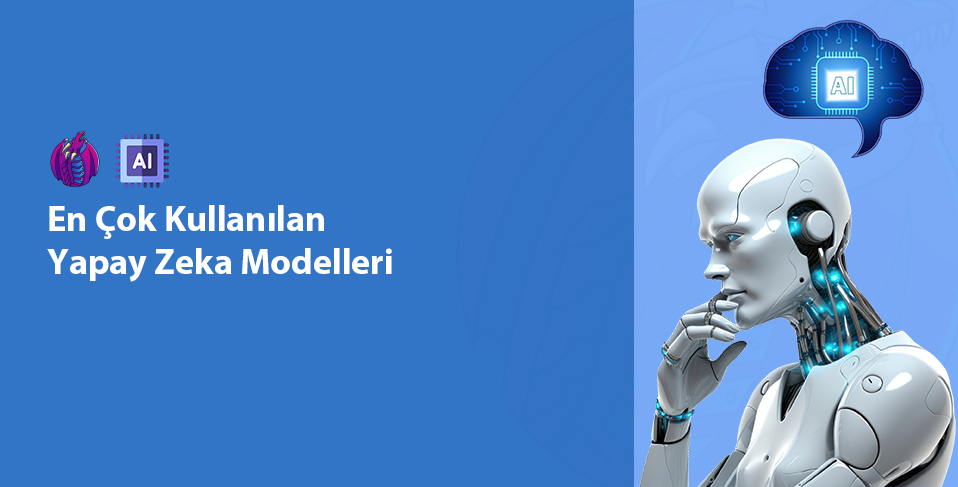Free 1-Year Domain Offer with WordPress GO Service

Most Used Artificial Intelligence Models
Today the most used artificial intelligence modelsis revolutionizing many sectors, from businesses to healthcare. In this guide artificial intelligence modelshow it works advantages of artificial intelligenceand you can find information on a wide range of perspectives. These models, which can quickly solve complex problems with human-like decision-making mechanisms, stand out with their potential to increase productivity.
What are Artificial Intelligence Models?
Artificial intelligence modelsare algorithms that enable machines to acquire human-like learning, reasoning and decision-making skills. Models learn patterns and make predictions by analyzing large datasets. For example, natural language processing models can understand sentence structure and generate text, or image processing models can analyze an image and identify objects.
Why is it Important?
The importance of these models is evident in many practical use cases, from automating and improving business processes to health diagnostics. In addition, businesses that work with the right model gain a competitive advantage and can increase their earnings with data-driven strategies.
If you are curious about technological innovations in similar subjects, e-commerce technology You can also check out our trends category.
Most Used Artificial Intelligence Models and Examples
Let's take a look at the most common types and concrete examples.
1. Deep Learning Models
Deep learning is a branch of machine learning based on layered artificial neural networks (Deep Neural Networks). For example, Image Recognition models are used in a wide range of applications, from cancer cell detection in medical scans to social media filters. The success of these models comes from training them with large data sets.
- Advantage It can process even very complex data with high accuracy.
- Disadvantage: The training process requires huge processing power and data.
2. Natural Language Processing Models (NLP)
NLP (Natural Language Processing) based models manage processes such as analyzing text to extract meaning and respond to questions. Chatbots and automatic translation tools are examples of this model. For example, a customer support chatbot instantly analyzes incoming texts and produces results.
- Advantage It offers real-time answers and language understanding capabilities.
- Disadvantage: It may not always understand the context of the language correctly and may produce incorrect results.
3. Machine Learning Models
Machine learning enables algorithms to learn from data and improve their performance over time. There are three main types: Supervised, Unsupervised and Reinforcement. For example, supervised learning is used for sales forecasting; unsupervised learning can be used for customer segmentation.
- Advantage It has a wide range of applications for different types of data.
- Disadvantage: The quality of the model depends on the accuracy of the data on which it is trained.
4. Recommendation Systems
Recommendation systems are models that offer personalized content based on user interactions. For example, on a shopping site, new products are listed "just for you" based on the products you have viewed before. Platforms like Netflix and YouTube also successfully use recommendation engines to retain their audiences.
- Advantage It personalizes the user experience and increases satisfaction.
- Disadvantage: It can reduce diversity by constantly presenting the user with similar types of content.
5. Speech Recognition Models
Voice assistants (Siri, Google Assistant, etc.) and call center automation are popular examples of this model. The human voice is transcribed into text and processed as a command, which enables fast interaction. It offers great convenience, especially in terms of accessibility (disabled users).
- Advantage Fast command input and easy operation.
- Disadvantage: External factors such as background noise can reduce the accuracy of the model.
Advantages and Disadvantages
Advantages of artificial intelligence However, there are also some risks and challenges with this technology. Here are the main pros and cons:
| Advantages | Disadvantages |
|---|---|
| Increased efficiency and fast processing | High cost infrastructure requirement |
| High accuracy on large data sets | Data privacy and security risks |
| Reducing human error through automation | Concerned about loss of labor force |
| Personalized user experience | The model is a black box |
Concrete Example: Automotive Sector
Automotive companies are using robotic artificial intelligence arms to increase efficiency on production lines. These arms minimize errors by placing parts in the correct position based on previous learning. As a result, the production process speeds up and costs due to human error are reduced. However, the increase in data volume and model complexity makes it essential for the company to constantly update the system.
Alternative Approaches and Methods
Of course, deep or machine learning models are not the only option. In some cases, it may be better to use regression analyses or statistics-based models. For small and relatively simple data sets, statistical methods are faster and less costly. In the same way with little user interaction projects, basic algorithms can also work instead of complex AI models.
Frequently Asked Questions
Q1: Why have AI models become so popular?
Due to its ability to analyze complex data and increase human productivity the most used artificial intelligence models has rapidly gained popularity around the world. And everyone, from large enterprises to small startups, wants to benefit from data-driven decision-making.
Q2: What exactly are the advantages of AI?
Advantages of artificial intelligence This includes automating business processes, improving accuracy, increasing the speed of data analysis and delivering personalized user experiences.
Q3: What is the difference between machine learning and deep learning?
Machine learning refers to a broader technological field and encompasses different algorithms. Deep learning is a sub-branch of machine learning that uses artificial neural networks for multilayer data processing. So deep learning is an extension of machine learning.
Conclusion and General Evaluation
To summarize the most used artificial intelligence modelsis being applied in more and more sectors, increasing productivity, efficiency and user satisfaction. Advantages of artificial intelligence Considering this, it can be predicted that this technology will become more widespread. However, it is very important to pay attention to disadvantages such as cost, data privacy and black box problem. It is possible to make the most of the power of artificial intelligence by choosing the right model according to the needs of companies and the structure of the data.
For more information, you can check out the current reports on the World Economic Forum website.



Leave a Reply